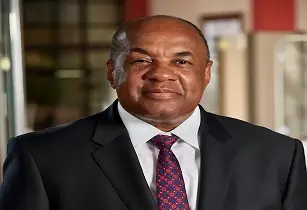The Bank of Namibia is seeking a balance between economic growth and fiscal stability, having implemented several lending rate increases in the past year to steer off inflation
The central bank is aiming to establish an effective and transparent fiscal regime for the country’s extractive industries – ahead of new developments in oil and gas exploration and green hydrogen production – along with a clear and stable local content framework that supports the growth of local businesses.
Energy Capital & Power spoke with Johannes Gawaxab, governor of the Bank of Namibia to understand how the bank is supporting the country’s burgeoning oil and gas industry to advance socioeconomic development.
Speaking of striking a balance between implementing local content and ownership requirements, while maintaining an attractive environment for foreign investment, Gawaxab said, "Foreign direct investment is better secured and sustainable if it contributes to broad-based benefits to the local economy. Local content, where such investment makes use of locally available goods and services as well as skills, will ensure sustainability and mutual benefit between the country and the investors. Investors accept this fact, and the balance needed is in terms of flexibility when goods and services, or skills are not locally available. If so, businesses should be able to acquire such goods and services or skills with ease from elsewhere.
"It is very important that local content comes at a competitive price and with competitive quality and reliability. Otherwise, the investments will just go elsewhere in the world. In general, our regulatory and business environment should be friendly to all investors, whether local or foreign. After all, they have to take the risk that goes with investment. However, everybody should also pay their fair share of tax, so it is sensible to have uniform tax rates across local and foreign-owned firms. Thus, as a country, Namibia should facilitate that where capacity does not exist, it is created over time, in terms of increasing capacity for local content, skills and competitiveness. In order to stay competitive in emerging industries, it is essential to strike a balance between regulating and promoting local content. This requires designing a policy that supports fairness, accessibility, and growth for local businesses. That would be a sustainable solution, especially in high unemployment environments such as Namibia."
Explaining the country's position within global decarbonisation efforts, he said, "The shift from fossil fuels to renewables is gradually taking place. However, it is reasonable to also continue investing in fossil fuel development, as consumer preferences, the stock of transport equipment and the energy infrastructure cannot be changed overnight. At the same time, investment in carbon-saving areas such as green hydrogen is the way to go for the long haul. Namibia is seeing action in both areas. Like many countries on the continent, Namibia is confronted by an energy deficit, which for the short and medium term, can only be met through a mixture of carbon fuels and green sources. In the domestic financial sector, we have observed some activities, with the local banks soliciting funds through green bonds aimed at being disbursed for renewable energy projects such as solar PV and wind farms.
"The energy sector is important for the Namibian economy and ensuring energy security is of paramount importance. The Bank acknowledges this importance, and in line with the discoveries that were announced last year, the Bank themed its 2022 Annual Symposium, 'Maximising economic growth from renewable and non-renewable energy sources in Namibia'. The symposium brought together key role players in the sector and the key recommendations from the symposium reflected the importance of building accountable and transparent resource governance institutions to avoid the resource curse, ensuring an effective fiscal regime in the extraction industry, and providing a clear and stable local content regulatory framework."
Giving a perspective on how competitive Namibia’s financial market is, Gawaxab said, "Currently, the real effective exchange rate of the Namibia Dollar is undervalued by historical standards. Therefore, production in Namibia is more competitive in international markets than before. The great road system, recent improvements to and expansion of the Port of Walvis Bay, sound macroeconomic policies, and due attention to the environment that Namibia is known for contribute to competitiveness. We are excited by the oil and gas developments, and also by green hydrogen, the expansion of solar power capacity, and developments around lithium and other materials that are helpful in the transition to low-carbon energy. We remain broadly aligned with and committed to Vision 2030.
"As for the future of domestic financing, our government is committed to living within its means and managing its deficit so that it can be readily financed, with the lion’s share financed in the domestic financial market. The Covid-induced large deficits of 2020/21 and 2021/22 have made way for much smaller ones, with further deficit reduction in the coming years. Fiscal sustainability is a high priority of the Government. The private sector’s financing needs will continue to be met by a combination of domestic and foreign sources. Foreign direct investment will be prominent in the oil, gas and green hydrogen initiatives. We believe our ready access to the South African capital market is a strong point and an important benefit of our membership in the Common Monetary Area."








